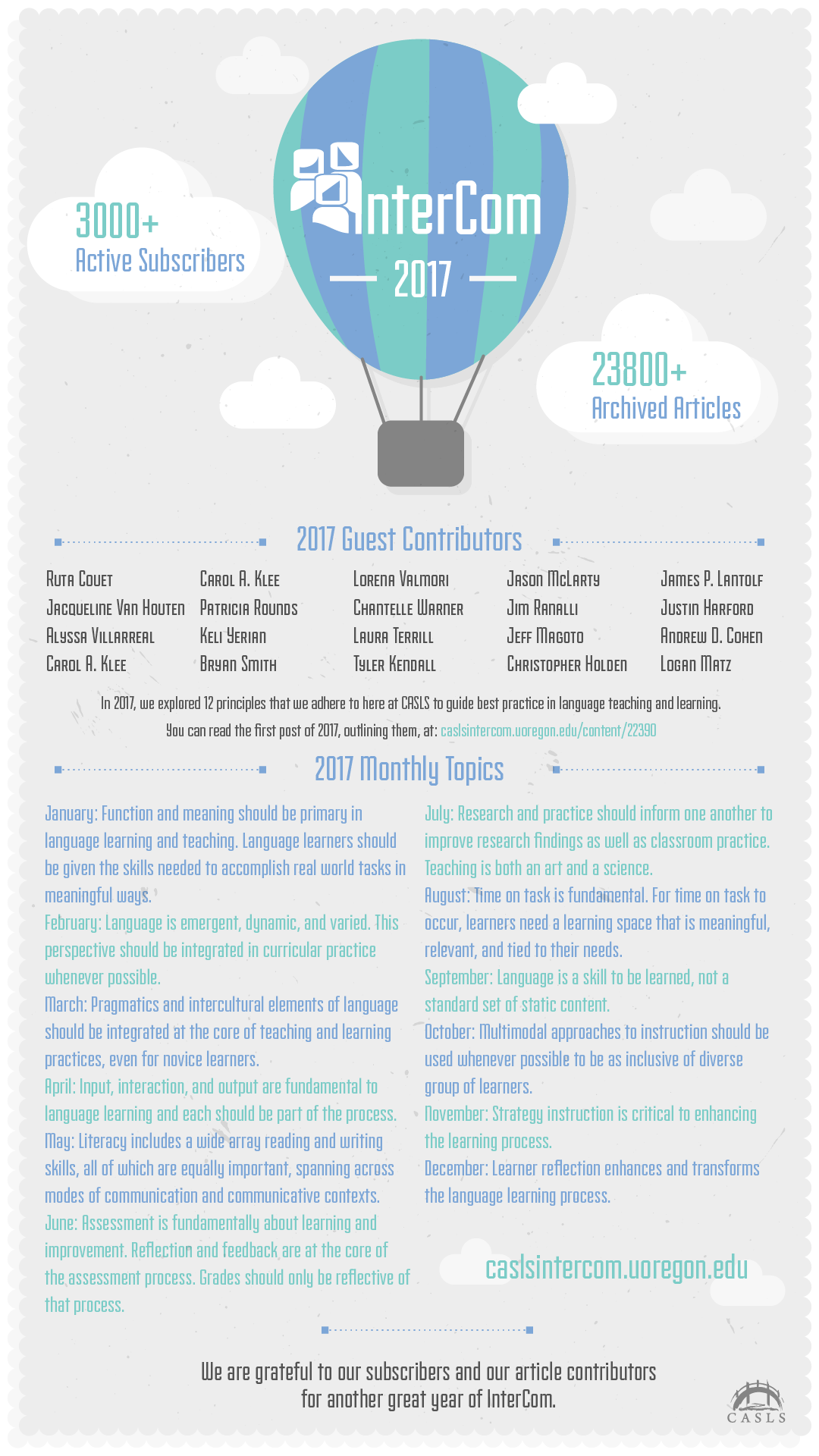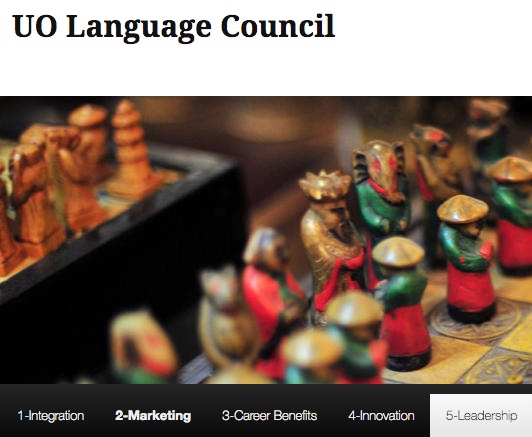Contents
Content Type: 1
Title: Ideas for When You Are Out
Body:
Deana Zorko shares both high-tech and low-tech ideas for activities for your students to do when you are absent in this short article: http://www.waflt.org/ideas-for-when-you-are-out/
Source: WAFLT
Inputdate: 2017-12-10 19:45:06
Lastmodifieddate: 2017-12-11 03:55:05
Expdate:
Publishdate: 2017-12-11 02:15:01
Displaydate: 2017-12-11 00:00:00
Active: 1
Emailed: 1
Isarchived: 0
Content Type: 1
Title: Feedback in the Foreign Language Classroom
Body:
Here is a short article summarizing types of feedback and possible responses to student errors and mistakes: https://wlclassroom.com/2017/11/24/effectivefeedback/
Source: World Language Classroom
Inputdate: 2017-12-10 19:45:53
Lastmodifieddate: 2017-12-11 03:55:05
Expdate:
Publishdate: 2017-12-11 02:15:01
Displaydate: 2017-12-11 00:00:00
Active: 1
Emailed: 1
Isarchived: 0
Content Type: 3
Title: InterCom in 2017: Looking Back
Body:

Source: CASLS Topic of the Week
Inputdate: 2017-12-12 10:23:34
Lastmodifieddate: 2018-12-24 13:54:01
Expdate:
Publishdate: 2017-12-25 02:15:01
Displaydate: 2017-12-25 00:00:00
Active: 1
Emailed: 1
Isarchived: 0
Content Type: 5
Title: Students’ Motivations for Language Learning: Travel and Career Pathways
Body:
 The University of Oregon (UO) Language Council promotes awareness of the benefits of language teaching and learning and strives to position the UO to undertake innovative, strategic approaches to pedagogy. The cross-disciplinary council includes faculty in world languages, literature, area studies, academic affairs, undergraduate studies business, study abroad, education, linguistics, admissions, and administrative offices. The council is convened by Harinder Khalsa, Senior Instructor of Italian; Jeff Magoto, Director of the Yamada Language Center; and Dennis Galvan, Interim Dean of Undergraduate Studies and Vice Provost for International Affairs.
The University of Oregon (UO) Language Council promotes awareness of the benefits of language teaching and learning and strives to position the UO to undertake innovative, strategic approaches to pedagogy. The cross-disciplinary council includes faculty in world languages, literature, area studies, academic affairs, undergraduate studies business, study abroad, education, linguistics, admissions, and administrative offices. The council is convened by Harinder Khalsa, Senior Instructor of Italian; Jeff Magoto, Director of the Yamada Language Center; and Dennis Galvan, Interim Dean of Undergraduate Studies and Vice Provost for International Affairs.
The council meets once each term during the academic year, and the fall term gathering was one of the largest attended meetings. During the meeting, Harinder Khalsa shared results of a recently completed market survey designed to understand UO students’ motivations for studying language and culture and the barriers they face.
Students cite their desire to travel and work in cultures that speak languages other than English as their main motivation for language learning. They hope that language proficiency will open career opportunities by allowing them to communicate with others. Many students also indicate a desire to improve their cognitive skills, which research shows accompanies language learning.
Barriers to language study at the UO include administrative structures related to the number and cost of credit hours associated with language courses along with scheduling challenges to fulfill major requirements in addition to language courses.
The UO Language Council plans to work with central administrative offices to address students’ barriers to language learning by exploring collaboration with professional schools and alternative course formats.
Source: CASLS Spotlight
Inputdate: 2017-12-13 11:56:18
Lastmodifieddate: 2018-01-01 03:55:37
Expdate:
Publishdate: 2018-01-01 02:15:01
Displaydate: 2018-01-01 00:00:00
Active: 1
Emailed: 1
Isarchived: 0
Content Type: 4
Title: Community Exploration with Ingress
Body:
By Katie Carpenter, Ben Pearson, and Stephanie Knight
The purpose of this activity is to help novice language learners acquire vocabulary by exploring their community. In order to engage in this exploration, learners play Ingress to guide their search for items needed to throw a party celebrating Afro-Latino heritage.
Objectives: Learners will be able to:
- Negotiate unknown meaning in a commercial app.
- Create lists in the target language of items needed to throw a party.
- Predict and verify the influence of African culture in Latino communities.
Modes: Presentational Writing, Interpretive Reading, Interpretive Listening
Resources: Ingress mobile app, Ingress introductory video on YouTube, Portal Documentation Sheet
1. Put learners into groups of four or fewer and explain to them that they will be tasked with planning an authentic Afro-Latino celebration. In order to plan this celebration, learners will create lists in the target language that are separated into the following categories: dress, decorations, food, and entertainment. The creation of the lists will occur in Step 4 of this activity.
2. Next, introduce learners to the Ingress app, a game designed to familiarize players with their local communities. Allow learners to view the Ingress introductory video on YouTube, download the game, and select a faction to represent. This step should take roughly 20 minutes for large classes and can easily be completed at home.
3. After that, learners will go to a neighborhood in which the target language is predominantly spoken. In their assigned groups, the learners will travel from portal to portal within the game. Their goal is to defend and hack as many portals as possible, all the while tracking their progress on the Portal Documentation Sheet. As the learners defend and hack portals, they must search out items for their party (food, dress, decorations, and entertainment). This step in the activity should take between 1-2 hours and will likely have to occur as a field trip.
4. After the outing is complete, learners will regroup as a class. Together, they will discuss all of the materials that they need to find for their party and brainstorm any other materials that they think they might need.
5. Finally, have learners reflect on the limitations of what they were able to find in the community as they played Ingress. It is fine if this discussion takes place in the first language, target language, or a combination of both. Use the following discussion questions as a guide: Where did you look for your materials? Why did you look there? How difficult or easy was it to find what you needed? What language did you learn from the process? How did interacting with your environment impact your learning?
Notes
Teachers may find it necessary to help learners figure out the meaning of words that they don’t already know as the learners are conducting their exploration.
Source: CASLS Activity of the Week
Inputdate: 2017-12-13 12:04:56
Lastmodifieddate: 2018-01-16 12:35:02
Expdate:
Publishdate: 2018-01-16 10:58:15
Displaydate: 2018-01-15 00:00:00
Active: 1
Emailed: 1
Isarchived: 0
Content Type: 5
Title: The Language Resource Centers Launch New Website
Body:
The Language Resource Centers (LRCs) have launched their new, one-stop website for language educators. With nflrc.org, educators can find curricular materials, assessments, research, professional development, advocacy resources, and more from all sixteen centers. Thanks to support from the U.S. Department of Education Title VI Program, most of the resources are available free of charge or at a low cost.
The website represents a partnership between CASLS, who re-envisioned the site’s design, and the Center for Open Educational Resources and Language Learning (COERLL), who coded and launched the website.
The LRCs support language teaching and learning by creating a national network of resources, and they offer services for more than 142 languages. Each of the sixteen centers also maintain their own websites packed with resources and information for teachers, students, administrators, government and business employees, and all who are interested in world language teaching and learning.
The U.S. Department of Education Title VI provides funding for the LRCs, and this article does not necessarily represent the policy of the U.S. Department of Education nor imply endorsement from the federal government.
Source: CASLS Spotlight
Inputdate: 2017-12-13 12:08:42
Lastmodifieddate: 2018-01-14 19:52:36
Expdate:
Publishdate:
Displaydate: 2018-01-15 00:00:00
Active: 0
Emailed: 0
Isarchived: 0
Content Type: 1
Title: New Journal: Applied Pragmatics
Body:
John Benjamins Publishing is pleased to announce a new journal to be first published in 2019: Applied Pragmatics. aims to enhance research on acquisitional pragmatics and hence accepts studies which have strong implications for teaching, learning, and assessing L2 pragmatics, including L2 English and other languages. The editorial board, which includes CASLS director Julie Sykes, encourages submissions from a wide range of topics falling within the scope of the journal. The topics can be approached from various interdisciplinary perspectives like globalization, world Englishes, teacher education, critical pedagogy, and conversation analysis.
Visit the publisher's website for this journal at https://benjamins.com/#catalog/journals/ap
Source: LINGUIST List
Inputdate: 2017-12-13 13:06:30
Lastmodifieddate: 2017-12-18 03:54:58
Expdate:
Publishdate: 2017-12-18 02:15:02
Displaydate: 2017-12-18 00:00:00
Active: 1
Emailed: 1
Isarchived: 0
Content Type: 1
Title: Book: Dynamics of Teaching and Learning Modern Hebrew as an Additional Language
Body:
From http://www.brill.com/products/book/dynamics-teaching-and-learning-modern-hebrew-additional-language
Dynamics of Teaching and Learning Modern Hebrew as an Additional Language: Using Hebrew as a means of instruction and acquisition
By Yona Gilead
Published by Brill
In Dynamics of Teaching and Learning Modern Hebrew as an Additional Language Yona Gilead presents original research into classroom interactional practices by offering a thick description of a successful beginner-level Modern Hebrew program at an Australian university. The book charts and theorizes the cohort’s teacher and students’ trajectory of using Hebrew as the main means of instructing and acquiring the language, and highlights seven key features which contribute to students’ learning. The book’s research-based findings and analysis of classroom dynamics contribute to theorizing the currently largely praxis-based discipline of L2 Modern Hebrew instruction, hence providing a stronger theoretical understanding of how and why students can be assisted in their language learning.
Visit the publisher's website at http://www.brill.com/products/book/dynamics-teaching-and-learning-modern-hebrew-additional-language
Source: Brill
Inputdate: 2017-12-13 13:10:14
Lastmodifieddate: 2017-12-18 03:54:58
Expdate:
Publishdate: 2017-12-18 02:15:02
Displaydate: 2017-12-18 00:00:00
Active: 1
Emailed: 1
Isarchived: 0
Content Type: 1
Title: Book: Understanding Chinese EFL Teachers' Beliefs and Practices in the Textbook-Based Classroom
Body:
From https://www.peterlang.com/view/product/83369
Understanding Chinese EFL Teachers' Beliefs and Practices in the Textbook-Based Classroom
By Xiaodong Zhang
Published by Peter Lang
Textbooks have long been considered a pivotal learning and teaching resource in classrooms. However, there is a paucity of research on how teachers use textbooks in relation to their beliefs, with analytic methods in such studies mainly restrained to content-based thematic analysis. To this end, from the perspectives of Halliday’s (1994) systemic functional linguistics (SFL) and Vygostky’s (1978) socio-cultural theory (SCT), this book explores how a Chinese college English teacher acts upon his beliefs and uses textbooks to mediate his students’ English learning in his classroom.
Drawing on constructs of the SFL-based appraisal and speech function as well as interview excerpts, the study reveals that in the textbook-based classroom the Chinese college English teacher acts upon his beliefs that are constructed by diverse contextual factors. Implications of this study include using SFL and SCT to explore educators’ beliefs and practices and also providing effective teacher education for Chinese college English instructors to reshape their beliefs so that they are better prepared to use textbooks in classrooms.
Visit the publisher’s website at https://www.peterlang.com/view/product/83369
Source: Peter Lang
Inputdate: 2017-12-13 13:13:09
Lastmodifieddate: 2017-12-18 03:54:58
Expdate:
Publishdate: 2017-12-18 02:15:02
Displaydate: 2017-12-18 00:00:00
Active: 1
Emailed: 1
Isarchived: 0
Content Type: 1
Title: Book: Language in Immigrant America
Body:
Language in Immigrant America
By Dominika Baran
Published by Cambridge University Press
Exploring the complex relationship between language and immigration in the United States, this timely book challenges mainstream, historically established assumptions about American citizenship and identity. Set within both a historical and a current political context, this book covers hotly debated topics such as language and ethnicity, the relationship between non-native English and American identity, perceptions and stereotypes related to foreign accents, code-switching, hybrid language forms such as Spanglish, language and the family, and the future of language in America. Work from the fields of linguistics, education policy, history, sociology, and politics are brought together to provide an accessible overview of the key issues. Through specific examples and case studies, immigrant America is presented as a diverse, multilingual, and multidimensional space in which identities are often hybridized and always multifaceted.
Visit the publisher’s website at http://www.cambridge.org/us/academic/subjects/languages-linguistics/sociolinguistics/language-immigrant-america#opt1FhcKMmWv16dA.97
Source: Cambridge University Press
Inputdate: 2017-12-13 13:14:17
Lastmodifieddate: 2017-12-18 03:54:58
Expdate:
Publishdate: 2017-12-18 02:15:02
Displaydate: 2017-12-18 00:00:00
Active: 1
Emailed: 1
Isarchived: 0
